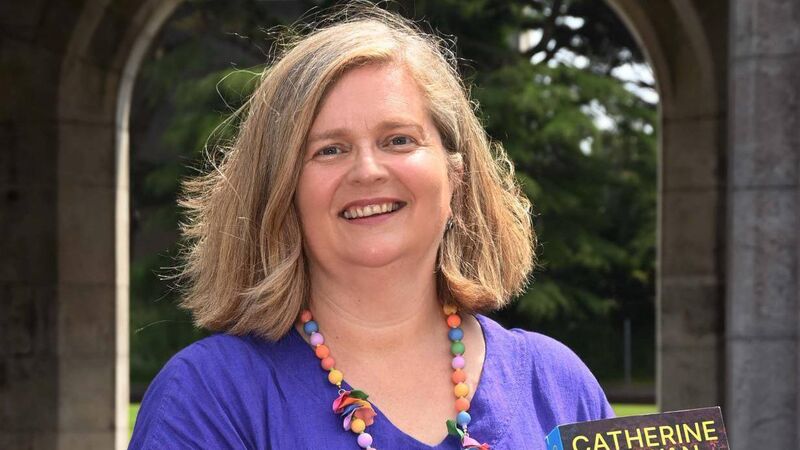Novel by Cork-based solicitor is set in UCC

Catherine Kirwan, author, who has written a new crime novel based in UCC called ‘A Lesson in Malice’.
DESCRIBING herself as a relative ‘newbie’ among the growing band of crime writers working in Ireland, Catherine Kirwan’s third novel has just been published.
A Lesson In Malice, set in UCC, has been described by thriller writer, Sam Blake, as “Agatha Christie meets John Grisham in the ancient halls of academia - dark, atmospheric and intricately plotted.”
It’s a gripping read and proof that Catherine has the staying power to keep going in the competitive world of crime writing. It’s a genre that is popular amongst Cork writers. Catherine lists them off: Catherine Ryan Howard, Tadhg Coakley, Amy Cronin, Michelle Dunne, Kevin Doyle, Michelle McDonagh and a new addition, Cobh-based Alice Bell.
Having grown up on a farm in the parish of Fews, Co Waterford, Catherine was keen to move to Cork to study at UCC after school. She wanted to be either a solicitor or a teacher. But because there were so few jobs for teachers at the time, she studied law and works in a Cork city practice. How she manages to keep down a demanding job with writing, as well as regularly attending cultural events, is a mystery but Catherine seems to thrive on being productive, and engaged with what’s going on in her adopted city.
A Lesson In Malice is told from the perspective of solicitor, Finn Fitzpatrick, who has a side interest in investigation. The character, star of Catherine’s previous two novels, is invited to UCC by an old college friend to speak at a law conference.
She is mystified as to why she has been invited and equally puzzled to be invited to the exclusive dinner in the president (a fictional first female one) of UCC’s private dining room afterwards. Then, three days later, a body is discovered in the college grounds - and everyone who was at the president’s dinner is a murder suspect - including Finn.
It transpires that the person who was killed had requested Finn’s presence at the conference. Interested in Finn’s previous investigations, the victim is described as having been well liked with an international reputation. What unravels are dark secrets, bitter rivalries and hidden agendas. Finn resumes her role as amateur (but intrepid) sleuth.
As Finn is aware, unnatural deaths occurring in the old gaol (which closed down in the 1950s) on the university campus, were nothing new. Over the centuries, it had seen many executions. Two men died there on hunger strike in 1920 and in 1921, six IRA men were shot by a firing squad on the university estate. A memorial to them in the college grounds is “passed by thousands of oblivious students every day”.
Catherine admits to also having been oblivious to the memorial when she was a student. But now, this avid chronicler of Cork, where she sets her novels, notices everything. If she sees a street or a laneway that she has never spotted before, she will explore it.
Catherine loves Cork but, like her protagonist, doesn’t consider it to be the centre of the universe.
Finn wonders why Professor Nell Deady, the president of UCC, has ended up in Cork. An elite scholar, she could have her pick of top global universities. She lives on the Western Road in a glass-walled penthouse apartment.
It was from walking around UCC during the Covid restrictions that Catherine, who lives in the Lough area, decided to set her novel in and around the campus.
“I had a vague idea that I’d like to set a novel in UCC. Then it crystallised during Covid.”
Catherine has a strong visual eye.
“I see things in pictures. I’m always looking at places that I’ve never been before.
I’m curious to go to different parts of the city. I don’t wear headphones while walking so I’m always listening. I don’t take notes. I let things absorb.
Asked how she comes up with her detailed plots, Catherine says: “I make them up as I go along. I always try and think of some sort of plausible way for the story to start. With a story like this, you have to ground the reader in it. The story has to be in some way sort of believable.
“Of course, I don’t think a solicitor in Cork is going to go around investigating crimes and solving them before the guards do. That isn’t really likely. But if I make the story plausible enough, the reader will suspend their disbelief and go with the story. To make it plausible for the reader, it has to be plausible for me.
“I had to find a way for Finn to go back to college and to spend a day there. I didn’t think it would be in any way realistic that she would be called in to investigate a crime. But if she was there already, she could be pulled into the story.”
Catherine says her latest novel is a stand-alone book.
“But for readers who have read my other books, there are little rewards. I hope that it’s easy to read. The print is big, there’s lots of white space in the pages and the chapters are short. When I’m reading a book like this, I don’t want it to be a chore.
I want it to be something I can escape to and forget the crappy day I’ve had.
Female crime writers in Ireland are having a moment. There’s the likes of Liz Nugent, London-based Irish writer, Jane Casey, Andrea Carter and the various Cork women writers mentioned above.
A collegiate group, they are not an official club, says Catherine. But they’re supportive of each other and read one another’s books.
What’s the appeal of crime writing?
“I’ve always read crime although I read other stuff as well. But I found that when the crash came, it was so depressing. I didn’t want to be listening to the IMF so I read a lot of crime. I just wanted to escape to a world where everything works out.
“Bad things happen but they work out in crime fiction in a way they don’t in real life.”
Catherine had always thought about writing “but I was afraid to try. Then, eventually, I said I’d give it a go.”
It all started about ten years ago when Catherine was part of a group that got together weekly at the Pav in Cork where they would read Joyce’s masterpiece, Ulysses, and discuss it. Catherine used to write up notes about the readings and add some humorous musings of her own. She posted them on Facebook. The group liked them so much that they printed them off and produced a little book of the posts.
“After the Ulysses group finished, I felt I was missing something. So I started writing my own thing in 2014. I wrote a short story that turned out to be a crime story.
I showed it to someone and she said she felt her stomach lurch when she realised what was happening in the story. I was thrilled with that.
“A few months later, I started writing a novel which became my first one, Darkest Truth. I entered it in the Daily Mail/Penguin competition. I was shortlisted, and out of that, I got the person who is now my agent.”
Catherine, who writes during her holidays and at weekends, has no plans to give up the day job. She says it wouldn’t be feasible financially and it’s not something that would interest her.
A ‘sociable introvert,’ she enjoys her own company when not out and about in Cork.
Clearly, she has found her niche in writing and is already thinking about her fourth novel. There really is no stopping Catherine Kirwan.







 App?
App?


